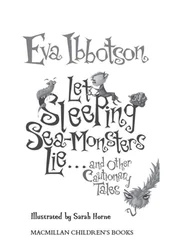When the Carters first came from England, their servants had cooked all the best dishes that were eaten in Brazil: freshly caught fish served in a saffron sauce, sweet peppers stuffed with raisins and rice, roasted sweetcorn and chunky soups. They had picked fresh fruit for the Carters: mangoes and guavas and pomegranates, and had gone out at night to search for turtle eggs.
But not for long.
‘Only British food will be served at my table,’ Mrs Carter had said.
So the servants had given up. They opened the tins that came from England; they poured boiling water onto whatever pudding powder Mrs Carter had put out for them, not caring if it was rock hard or running off the plate — and went back to their huts to make themselves decent food at night.
‘Shall I call Miss Minton?’ Maia had asked as they sat down. ‘Perhaps she didn’t hear the gong?’
‘Miss Minton will have supper in her room,’ said Mrs Carter. ‘Governesses join us at breakfast and lunch, but never at dinner.’
‘Miss Porterhouse never had dinner with us,’ said Beatrice.
‘Nor did Miss Chisholm.’
Maia was silent. She had had a governess before she went to the Academy. She’d been part of the family, sharing all meals except formal dinner parties, when she and Maia ate together in the schoolroom, and to her dismay Maia felt a lump come to her throat as she remembered the warmth and laughter of her old home.
After supper the girls worked on their embroidery and Mr Carter went to his study. He had said almost nothing during the meal, only complaining once because the servants had moved some papers on his desk. ‘You can’t trust anyone out here,’ he grumbled, and told Maia to beware because all the Indians were out to cheat you.
‘I expect you must be tired after your journey,’ said Mrs Carter, and Maia said, yes she was, and went back to her room.
Presently there was a knock at the door, and Miss Minton came in. She looked at Maia’s room in silence. ‘I’m next door,’ she said, ‘so you can always knock on the wall. Do you need any help with your hair?’
Maia shook her head but Miss Minton took the silver-backed hairbrush and started to brush the long thick hair. She said nothing for a while, letting Maia gather herself together.
‘It’s not quite like I thought it would be, is it?’ said Maia ruefully. ‘I don’t think the twins like me.’
‘They will do when they get to know you. Remember, twins are used to living in their own world.’ She put down the brush and began to re-plait Maia’s hair. ‘Give them time.’
‘Yes. It’s just… I don’t really understand why the Carters offered to have me.’
Miss Minton opened her mouth and closed it again. She knew exactly why they had offered to have Maia. Her interview with Mrs Carter had made that absolutely clear, but she would not tell Maia. The child had been hurt enough by her parents’ death.
‘You’ll see, it will all look different in the morning. Have courage. Courage is the most important thing.’
‘Yes.’ Left alone, Maia climbed into bed. There was no fan, it was incredibly hot and stuffy. But she would have courage. She stretched out her hand and looked at the tiny bruise in the skin. It was silly to think that Gwendolyn had dug her fingernail into her palm. Why should she want to hurt someone she had never met? She must have had something caught under her nail and not realized it; a tiny piece of wire or a thorn.
But not a thorn from a rose, in this house without flowers.
Maia turned out the lamp, but still she could not sleep. After a while she got up and pulled a chair up to the window.
Out there in the forest were the huts of the Indians who worked for the Carters — not cool, native huts with thatched roofs, but wooden shacks built to house servants. She lifted a corner of the mosquito net and saw fireflies — a hundred points of dancing light — and heard the croaking of frogs. How alive it was out there, and how dead inside the house!
As she watched she saw a girl in a bright frock, carrying a baby on her hip, go into the middle hut. As she opened the door there was the jabber of a tame parrot, the brief yapping of a little dog. Then came the sound of singing — a slow crooning song. A lullaby for the baby perhaps.
Then silence again… But just before she left the window, she heard somebody whistling. The sound came from behind the end hut, set a little way back in the forest, where the rubber-gatherers slept — but the strange thing was that she knew the tune. It was a North Country air — Blow The Wind Southerly. Her mother had sung it often.
She listened till it died away and went back to bed. Hearing the familiar tune so far away from home had comforted her, and almost at once she slept.
Mr and Mrs Carter had come to the Amazon from Littleford-on-Sea, a small town in the south of England.
Mr Carter had worked in a bank, but he had lost his job and decided to take his family to the Amazon to make his fortune. Many Europeans went out at that time, some to plant coffee or cocoa, some to try and find gold — but most to harvest rubber, the ‘black gold’ of the Amazon. It sounded an easy way to get rich. Rubber trees grew all over the Amazon basin; all one had to do was hire some Indians to collect the sap from the trees, take it to the sheds to be smoked, and send the balls of crude rubber down the river to be exported.
And certainly a lot of people had made their fortunes. There were people in Manaus who lived like princes. But not the Carters. Because to get the juice from the rubber trees you need Indians who know the forest and understand the trees. And Indians are proud people who have their own lives. If you treat them like slaves they don’t revolt or go on strike; they simply melt back into the forest, join their tribes and disappear.
This is what had happened to the Indians which the Carters had employed. Every month Mr Carter lost some of his work force, and far from making his fortune, he was getting poorer and poorer.
So when Mr Murray had written to ask if they would have Maia to live with them, the Carters had been overjoyed. They did not want Maia, they were far too selfish to want anybody, but they needed her.
Or rather they needed the money she brought with her. Mr Murray had never told Maia how much money her father had left her; she knew she did not have to worry about having enough and she seldom thought about it. But the fact was that she was rich now, and would be richer when she was twenty-one. The Carters had explained that life was very expensive on the Amazon; everything had to be shipped from England — every digestive biscuit, every jar of marmalade. So they had asked a very large sum of money for having Maia to live with them.
‘We’d love to have her for nothing,’ Mrs Carter had written, ‘but times are hard.’
Mr Murray had agreed but he was a careful man, as lawyers are. He had sent the first month’s keep with Miss Minton for he knew she could be trusted. Later, Maia’s allowance, and the salary he was paying Miss Minton to look after her, would go straight into a bank in Manaus.
And Miss Minton had only taken a few minutes to realize why the Carters wanted Maia. Mrs Carter had not been able to hide her relief and her greed as Miss Minton counted out the notes the lawyer had trusted her with. As for Beatrice and Gwendolyn, they had been told nothing — only that a distant cousin was coming to stay with them and must be welcomed. But the twins had never welcomed anybody in their lives.
Maia woke next morning not to the sound of bird-song, but to a noise she could not place at first. A sort of swishing, squelching noise followed by thumps and bumps and cries of ‘Out!’
She put her head round the door. In the corridor, wearing a dressing gown and a turban to protect her hair, was Mrs Carter. She had the flit gun in her hand and was carefully squirting every nook and cranny with insect-killer. Then she disappeared into the cloakroom, fetched a broom, and began to thump and bang on the ceiling to get rid of possible spiders. Next came a bucket full of disinfectant and a mop with which she squelched across the tiled floor — and all the time she muttered, ‘Out!’ or ‘That will settle you!’ to the insects that she thought might be there. Mrs Carter did nothing else in the house, but this early morning hunt was one she did not trust to the servants.
Читать дальше












